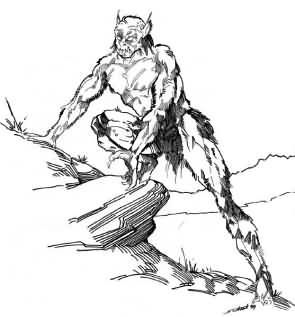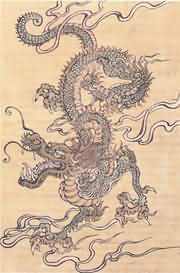
Chapter XLII: Beowulf
ALTHOUGH the manuscript which contains the epic of Beowulf was written about 1000 A.D., the poem itself was known and had been elaborated upon for centuries by minstrels who recited the heroic exploits of the son of Ecgtheow and nephew of Hygelac, King of the Geats, whose kingdom was what is now Southern Sweden.

Grendel
All Sleep save One
THEN from the moorland, by misty crags,
with God’s* wrath laden, Grendel came.
The monster was minded of mankind now
sundry to seize in the stately house.
Under welkin he walked, till the wine-palace there,
gold-hall of men, he gladly discerned,
flashing with fretwork. Not first time, this,
that he the home of Hrothgar sought, --
yet ne’er in his life-day, late or early,
such hardy heroes, such hall-thanes, found!
To the house the warrior walked apace,
parted from peace; the portal opended,
though with forged bolts fast, when his fists had
struck it,
and baleful he burst in his blatant rage,
the house’s mouth. All hastily, then,
o’er fair-paved floor the fiend trod on,
ireful he strode; there streamed from his eyes
fearful flashes, like flame to see.
From Beowulf
*Grendel, of the Eoten (giant) race, the death shadow, the
mark stalker, the shadow ganger, is also variously called god's
foe, fiend of hell, Cain's brood, etc. It need hardly be
explained that the latter terms are additions to the original
poem, made, probably, by monks who copied the manuscript. A
belief in Wyrd, the mighty power controlling the destinies of
men, is the chief religious motive of the epic. In
line 1056 we find a curious blending of pagan and Christian
belief, where Wyrd is withstood by the "wise God."
From Chapter 2: English
Literature by William J. Long

[ See: Beowulf, Translated by Gummere ]
In his boyhood Beowulf gave evidence of the great feats of strength and courage which in manhood made him the deliverer of Hrothgar, King of Denmark, from the monster, Grendel, and later in his own kingdom from the fiery dragon which dealt Beowulf a mortal blow.
[ See: Folk-Lore And Legends Scandinvian ]
[ See: Viking Tales ]
Beowulf’s first renown followed his conquest of many sea–monsters while he swam for seven days and nights before he came to the country of the Finns. Helping to defend the land of the Hetware, he killed many of the enemy and again showed his prowess as a swimmer by bringing to his ship the armor of thirty of his slain pursuers. Offered the crown of his native land, Beowulf, just entering manhood, refused it in favor of Heardred, the young son of the queen. Instead, he acted as guardian and counsellor until the boy–king grew old enough to rule alone.
[ See: The Danish History, by Saxo Grammaticus
For twelve years, Hrothgar, King of Denmark, suffered while his kingdom was being ravaged by a devouring monster, named Grendel. This Grendel bore a charmed life against all weapons forged by man. He lived in the wastelands and nightly prowled out to visit the hall of Hrothgar, carrying off and slaughtering many of the guests.
Beowulf, hearing from mariners of Grendel’s murderous visits, sailed from Geatland with fourteen stalwart companions to render Hrothgar the help of his great strength. Landing on the Danish coast, Beowulf was challenged as a spy. He persuaded the coastguards to let him pass, and he was received and feasted by King Hrothgar. When the king and his court retired for the night, Beowulf and his companions were left alone in the hall. All but Beowulf fell asleep. Grendel entered. With a stroke he killed one of Beowulf’s sleeping men, but Beowulf, unarmed, wrestled with the monster and by dint of his great strength managed to tear Grendel’s arm out at the shoulder. Grendel, mortally wounded, retreated, leaving a bloody trail from the hall to his lair.
[ See: Beowulfs Expedition To Heort ]
All fear of another attack by Grendel allayed, the Danes returned to the hall, and Beowulf and his companions were sheltered elsewhere. Grendel’s mother came to avenge the fatal injury to her monster son and carried off a Danish nobleman and Grendel’s torn–off paw. Following the blood trail, Beowulf went forth to despatch the mother. Armed with his sword, Hrunting, he came to the water’s edge. He plunged in and swam to a chamber under the sea. There he fought with Grendel’s mother, killing her with an old sword he found in the sea cavern. Nearby was Grendel’s body. Beowulf cut off its head and brought it back as a trophy to King Hrothgar. Great was the rejoicing in the hall and greater was Beowulf’s welcome when he returned to Geatland, where he was given great estates and many high honours.
[ See: Christian Writers Of The Anglo-Saxon Period ]

Chinese dragon, colour engraving on wood, Japanese Chinese
school, 19th Century
From Wikipedia, the free encyclopedia
Shortly afterward, Heardred, the boy–king, was killed in the war with the Swedes. Beowulf succeeded him to the throne.
For fifty years Beowulf ruled his people in peace and serenity. Then suddenly a dragon, furious at having his treasure stolen from his hoard in a burial mound, began to ravage Beowulf’s kingdom. Like Grendel, this monster left its den at night on its errand of murder and pillage.
Beowulf, now an aged monarch, resolved to do battle, unaided, with the dragon. He approached the entrance to its den, whence boiling steam issued forth. Undaunted, Beowulf strode forward shouting his defiance. The dragon came out, sputtering flames from its mouth. The monster rushed upon Beowulf with all its fury and almost crushed him in its first charge. So fearful grew the struggle that all but one of Beowulf’s men deserted and fled for their lives. Wiglaf remained to help his aged monarch. Another rush of the dragon shattered Beowulf’s sword and the monster’s fangs sunk into Beowulf’s neck. Wiglaf, rushing into the struggle, helped the dying Beowulf to kill the dragon.
[ See: The Evolution Of The Dragon By G. Elliot Smith ]
[ See: Dragons and Dragon Lore By Ernest Ingersoll ]
[ See: Creation and the Dragon Myth ]
[ See: Battle between Marduk and the Dragon ]
Before his death, Beowulf named Wiglaf his successor to the throne of Geatland and ordered that his own ashes be placed in a memorial shrine at the top of a high cliff commanding the sea. Beowulf’s body was burned on a vast funeral pyre, while twelve Geats rode around the mound singing their sorrow and their praise for the good and great man, Beowulf.
[ See: Poetry Of The Anglo-Saxon Or Old-English Period (405-1050)]
PROVERBIAL EXPRESSIONS
- No. 1
MATERIEM superabat opus.- Ovid.
The workmanship surpassed the material.- No. 2.
Facies non omnibus una,
Nec diversa tamen, qualem decet esse sororum.- Ovid.
Their faces were not all alike, nor yet unlike, but such as those of sisters ought to be.
- No. 3.
Medio tutissimus ibis.- Ovid.
You will go most safely in the middle.- No. 4.
Hic situs est Phaeton, currus auriga paterni,
Quem si non tenuit, magnis tamen excidit ausis.- Ovid.
Here lies Phaeton, the driver of his father’s chariot, which if he failed to manage, yet he fell in a great undertaking.
- No. 5.
Imponere Pelio Ossam.- Virgil.
To pile Ossa upon Pelion.- No. 6.
Timeo Danaos et dona ferentes.- Virgil.
I fear the Greeks even when they offer gifts.- No. 7.
Non tali auxilio nec defensoribus istis
Tempus eget.- Virgil.
Not such aid nor such defenders does the time require.- No. 8.
Incidit in Scyllam, cupiens vitare Charybdim.
He runs on Scylla, wishing to avoid Charybdis.- No. 9.
Sequitur patrem, non passibus aequis.- Virgil.
He follows his father with unequal steps.- No. 10.
Monstrum horrendum, informe, ingens, cui lumen ademptum.– Virgil.
A horrible monster, misshapen, vast, whose only eye had been put out.- No.11.
Tantaene animis coelestibus irae?- Virgil.
In heavenly minds can such resentments dwell?- No. 12.
Haud ignara mali, miseris succurrere disco.- Virgil.
Not unacquainted with distress, I have learned to succour the unfortunate.
- No. 13.
Tros, Tyriusve mihi nullo discrimine agetur.- Virgil.
Whether Trojan or Tyrian shall make no difference to me.- No. 14.
Tu ne cede malis, sed contra audentior ito.- Virgil.
Yield thou not to adversity, but press on the more bravely.
- No. 15.
Facilis descensus Averni;
Noctes atque dies patet atri janua Ditis;
Sed revocare gradum, superasque evadere ad auras,
Hoc opus, hic labor est.- Virgil.
The descent to Avernus is easy; the gate of Pluto stands open night and day; but to retrace one’s steps and return to the upper air, that is the toil, that the difficulty.
- No. 16.
Uno avulso non deficit alter.- Virgil.
When one is torn away another succeeds.- No. 17.
Quadrupedante putrem sonitu quatit ungula campum.- Virgil.
Then struck the hoofs of the steeds on the ground with a four–footed trampling.
- No. 18.
Sternitur infelix alieno vulnere, coelumque
Adspicit et moriens dulces reminiseitur Argos.- Virgil.
He falls, unhappy, by a wound intended for another; looks up to the skies, and dying remembers sweet Argos.
THE END
